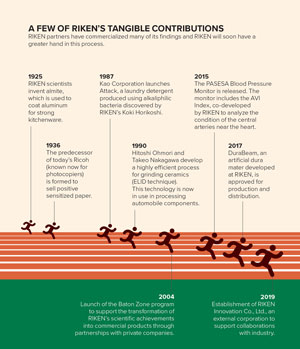
As scientists, there is nothing more rewarding than seeing years' worth of relentless research effort make an impact in the real world. If inventing products from academic labs were simple, industry collaborations would be a clear win-win for everyone. The reality, however, is that the path is fraught with obstacles-and more often than not it's human factors, such as emotions and motivations, that impede progress. RIKEN is now working on ways to support researchers in their efforts to develop innovative products. A new RIKEN-funded corporation is yet another leap forward in making industry-academia partnerships fruitful.
Businesses, I should add, are also keen on having academics on board. Until a product is ready for the market, there are almost always small modifications-adjustments to engineering specs or tweaks to computational formulas-best done by the innovators already deeply involved in its development. However, Japanese academics consider the time it takes to do this detailed work as drawing them away the next big discovery. In the past, the researchers who collaborated to do this have been the outliers.
Baton Zone
Baton Zone is RIKEN's flagship program bridging research and business. Within this program, we designate project leaders from industry and sub-leaders from RIKEN to form a joint team on one of RIKEN's campuses. The attraction for RIKEN researchers here is the potential to discover new ideas for research through the repeated trial and error of developing a product. During this time, researchers may begin to see their work in a different light-I'm told it gives them inspiration for new studies, which could evolve into yet more products worth developing.
Since its launch 16 years ago, the program has brought together businesses and RIKEN research labs in 36 mid- to long-term projects. We've seen incredible cases of success; an example from the field of medicine is DuraBeam, an artificial dura mater (a membrane that surrounds the brain and spinal cord) that is pasted onto a patient's skull during surgery. Using a RIKEN-developed polymer resin processing technology, DuraBeam overcomes the difficulties that other products have had with adhesion, minimizing the time it takes for surgery and thus reducing the risk of infections. With its high biocompatibility, it also overcomes the risk of adhesion to other organs, which becomes an issue in the long term.
In spring 2019, we moved from a funding system in which costs are shared equally by RIKEN and a partner company, to a new structure in which RIKEN funds a quarter of total research costs. This, I believe, is a healthier funding balance, as profits from commercialized products go to the business. RIKEN continues to partially fund the program thereafter, as we see value in the seeds of ideas born from collaborations.
While the Baton Zone is designed for projects close to the commercialization stage, the Industrial Co-creation Program (ICoP) facilitates open innovation for research concepts in an earlier stage of development. The objective is for upper-level management and researchers from industry to join RIKEN in brainstorming ideas for projects that tackle societal issues. The ideas emerging from ICoP tend to be for basic research, and these eventually mature into collaborative research projects like the ones undertaken in the Baton Zone program. As of spring 2019, we have 11 business partners working with RIKEN research centers-Toyota, Olympus, and Kao, to name a few.
Interest in collaborations for artificial intelligence (AI) has also soared over the past few years, with four partners joining forces with the RIKEN Center for Advanced Intelligence Project (AIP). One of these is a partnership with Toshiba that seeks to develop self-learning AI software to facilitate next-generation manufacturing and social infrastructure projects. One potential application, for example, is to control robots involved in routine infrastructure inspections-at present, these robots don't function well in changing environmental conditions, including rain and wind.
Newcomer to commercialization
 A FEW OF RIKEN'S TANGIBLE CONTRIBUTIONS
RIKEN partners have commercialized many of its findings and RIKEN will soon have a greater hand in this process. © 2020 RIKEN
A FEW OF RIKEN'S TANGIBLE CONTRIBUTIONS
RIKEN partners have commercialized many of its findings and RIKEN will soon have a greater hand in this process. © 2020 RIKEN
A newcomer to RIKEN's industry collaboration ecosystem is RIKEN Innovation Co., Ltd., an external corporation established in September 2019 to bolster support for collaborations with industry. Concerningly, the conversation about industry-academia collaboration in Japan is heavily skewed towards initiating a partnership and tends to overlook providing support throughout the lifetime of a project. At the moment, collaborative teams are generally left to their own devices after partnerships kick off; given the aforementioned cultural disparities in academia and industry, it's an invitation for failure. One of the main functions of the new company is to provide ongoing project management, based on the personalities and work styles of the teams.
Thanks to a revision in the law in 2019, RIKEN is now able to invest in businesses that profit from RIKEN's research output. As a result, the RIKEN Innovation Company is, and will be, wholly funded by RIKEN. In addition to research coordination, the company provides multifaceted support, notably, in applying for technology licensing and venture capital. Patents are key to launching start-ups and protecting high-profile projects; there is now a stronger need than ever before to strategically foster patent-winning work years in advance of commercialization. To make sure this happens, RIKEN's new company will work in tandem with research teams. Its employees will start with market research on intellectual property strategies, help collecting supporting data to strengthen patents, and ultimately help to organize appropriate and nuanced contracts, for instance, flexible types of contracts for emerging areas such as artificial intelligence.
The company will also assist in developing ideas for startups derived from RIKEN research. This new capacity will especially be useful to the large number of projects where the market size for a promising product is viable, but relatively small, as projects like these tend to fly under the radar at large corporations. The new company will also help advise RIKEN on its funding distribution strategy among its existing startups and provide business management support.
RIKEN's big investment
With the RIKEN Innovation Company, we're piloting-for the first time in Japan-a scheme that brings together, in an external entity, support for technology licensing and for startups. We absolutely need the company to grow, since we expect it to channel significant output from RIKEN's basic research into society. A handful of unforeseen challenges will come our way, and that's okay; it's part of our intention to adapt the scheme as we go along.
One criticism I anticipate is this: Why establish an external corporation when the same tasks can be undertaken internally? My answer is that it is for the sake of customer satisfaction. If the organization were part of RIKEN, the services it provides would be RIKEN-centric, following rigid institutional rules for budgeting and staffing. On the other hand, with an external organization, RIKEN and industry partners both become clients. The organization's priority is to offer a solution that maximizes the benefits for both parties. That makes it much easier to identify priorities on actionable items. At the end of the day, it's the soft skills like a service-oriented business mindset and a fast-paced company culture that make or break a project. The bureaucratic, first-in first-out work style of traditional academic institutions simply will not work for securing patents in a fast-paced environment. An additional plus is that being a corporation lowers the barriers for other businesses reaching out for collaboration opportunities.
We've analyzed a wealth of data and are confident that RIKEN Innovation will be able to carry industry-academia collaborations forward. Now, it's a matter of making a success of the new strategy. The staff at the new company come from various backgrounds in academia and business; I anticipate three years for the company's culture to meld with RIKEN's, and five years until it is fully operating. At this point, micromanagement and nit-picking will kill the program. For the five years it takes until this new arm is at full throttle, I'd like to ask you all to provide only constructive feedback that will help the project to improve.
About the Researcher
Hidetoshi Kotera, Executive Director

Hidetoshi Kotera was appointed an executive director at RIKEN in April 2018. He is also program director of the RIKEN Industrial Co-creation Program (ICoP), which supports joint research with industry, and the RIKEN Baton Zone Program, which helps transfer RIKEN's scientific achievements so that they can be used in commercial products through partnerships with private companies. Additionally he serves as the director of the RIKEN Cluster for Science, Technology and Innovation Hub, which aims to create and strengthen networks for research and.






